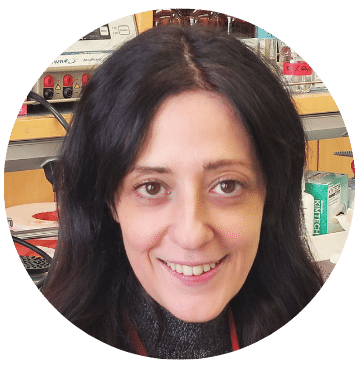Researcher Spotlight: Rossella Marullo, MD, PhD
Joan & Sanford I. Weill Medical College of Cornell University

loss-of-function mutations in the gene TOX (TOXLOF). TOX is a transcription factor that regulates lymphoid tissue development. TOXLOF events co-occur with mutations that result in constitutive activation of NFkB pathway. NF-kB is a family of transcription factors that control the expression of genes involved in survival, proliferation, stress responses, and inflammation. These associations suggest a potential onco- suppressive role for TOX in DLBCL, especially in the context of NF-kB activation. However, whether a mechanistic link between the activity of TOX and NF-kB exists is not known, nor is it known how TOXLOF modifies the biology of NF-kB-driven lymphomas. Dr. Rossella Marullo’s LRF research project is to elucidate the molecular mechanism(s) by which lack of TOX expression sustains NF-kB
lymphomagenesis. “Understanding the biology of NF-kB lymphomas is of high clinical relevance, as it will allow identifying novel therapeutic opportunities toward a subgroup of aggressive DLBCLs for which no curative therapy is currently available,” she notes.
Dr. Marullo received her MD at the University of Messina School of Medicine, in Messina Italy, and completed her PhD at the School of Medicine, University of Messina, in Italy, and Emory University. She is presently an Instructor in Medicine at Weill Cornell Medicine, where she is fully dedicated to translational research. Her devotion to lymphoma research comes from her admiration of the clinical research process. “What I like about research is the teamwork underlying any breakthrough in cancer. The research cycle flows from unsolved clinical questions to laboratory findings back to the patients’ besides. Thus, progress in cancer research results from a collaborative effort of laboratory scientists, clinical researchers, patients, and many others,” Dr. Marullo says. “Indeed, the most gratifying aspect of my job is to be aware that the knowledge generated by my research will be used to design novel treatments for patients.”
Dr. Marullo notes that the LSRMP workshop has given her
“the opportunity to receive detailed feedback about the scientific aspect of my project and how to improve it. I also greatly benefited from the lectures focused on career development, as these lectures were very interactive and provided practical advice and real-life experiences. Furthermore, I was able to connect with many peers and senior scientists to start building a network of potential collaborators.”


